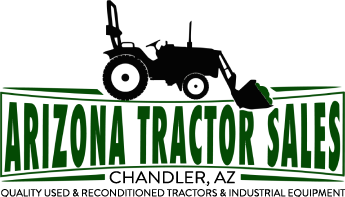Top 10 Tips and Tasks for Tractor Pallet Forks: A Guide from Arizona Tractor Sales
Top 10 Tips and Tasks for Tractor Pallet Forks: A Guide from Arizona Tractor Sales
Tractor pallet forks are essential tools for a variety of lifting and material handling tasks. Whether you’re in agriculture, construction, or landscaping, having the right knowledge and maintenance practices for your pallet forks can significantly improve your efficiency and safety. At Arizona Tractor Sales, we’re dedicated to helping you get the most out of your equipment. Here are our top 10 tips and tasks for optimizing the use of your tractor pallet forks.
1. Choose the Right Pallet Forks
a. Fork Size and Capacity: Select pallet forks that match the size and weight capacity required for your tasks. Consider the dimensions of the forks and their load-bearing capabilities to ensure they meet your specific needs.
b. Fork Material: Opt for durable materials such as high-strength steel to handle heavy loads. Quality material ensures longevity and reliability.
2. Proper Installation and Adjustment
a. Secure Attachment: Ensure that pallet forks are properly attached to your tractor’s loader. Check that all pins and locking mechanisms are securely fastened to prevent accidents.
b. Adjust Fork Width: Adjust the width of the pallet forks to accommodate different sizes of loads. Proper adjustment helps in balancing the load and reduces the risk of tipping.
3. Regular Inspections
a. Check for Wear and Damage: Inspect your pallet forks regularly for signs of wear, cracks, or deformation. Address any issues promptly to maintain safety and performance.
b. Inspect Hydraulic Connections: Ensure that hydraulic connections and hoses are in good condition and free from leaks. Proper hydraulic function is crucial for the smooth operation of your pallet forks.
4. Safe Operating Practices
a. Load Center of Gravity: Always ensure that the load’s center of gravity is balanced and positioned correctly on the pallet forks. This helps in maintaining stability and preventing accidents.
b. Avoid Overloading: Do not exceed the rated capacity of your pallet forks. Overloading can cause equipment failure and pose safety risks.
5. Load Handling Techniques
a. Use Proper Lifting Techniques: Tilt the forks slightly forward when lifting to ensure better stability and control. Lift loads smoothly and avoid sudden movements.
b. Secure Loads: If necessary, use additional securing methods such as straps or chains to prevent loads from shifting or falling during transport.
6. Maintenance and Cleaning
a. Clean Regularly: Keep your pallet forks clean from debris, mud, and other contaminants. Regular cleaning helps prevent corrosion and maintains the forks' functionality.
b. Lubricate Moving Parts: Lubricate all moving parts, including pivot points and hydraulic connections, to ensure smooth operation and prevent wear.
7. Storage Tips
a. Store Properly: When not in use, store your pallet forks in a dry, sheltered area to protect them from weather-related damage and corrosion.
b. Elevate Forks: Store pallet forks in an elevated position to avoid damage from contact with the ground or other equipment.
8. Operator Training
a. Train Operators: Ensure that all operators are properly trained in using pallet forks. Proper training includes understanding safe operating procedures and handling techniques.
b. Review Safety Protocols: Regularly review safety protocols and best practices with your team to keep safety at the forefront of operations.
9. Addressing Common Issues
a. Fork Alignment: If you notice issues with fork alignment or uneven wear, address them promptly to ensure accurate load handling.
b. Hydraulic Performance: If you experience issues with hydraulic performance, such as slow or erratic movement, have them checked by a professional to prevent further complications.
10. Professional Assistance
a. Seek Expert Help: For complex issues or maintenance tasks, consult with professionals who specialize in tractor equipment. Arizona Tractor Sales offers expert service and support to ensure your pallet forks remain in top condition.
b. Regular Service Checks: Schedule regular service checks with our team to keep your pallet forks and other equipment performing at their best.
Why Choose Arizona Tractor Sales?
1. Expert Advice: Our team at Arizona Tractor Sales provides expert advice on selecting and maintaining pallet forks tailored to your specific needs.
2. Quality Equipment: We offer high-quality pallet forks and other attachments designed to deliver exceptional performance and durability.
3. Comprehensive Support: From maintenance tips to professional service, we’re here to support all your equipment needs and ensure optimal operation.
For more information on tractor pallet forks or to schedule a service, visit www.arizonatractorsales.com or call us at (602) 377-2850. Enhance your equipment’s efficiency and safety with the right practices and support from Arizona Tractor Sales.
Conclusion
Proper care and usage of your tractor pallet forks can significantly enhance your operational efficiency and safety. By following these top 10 tips and tasks, you can ensure that your pallet forks remain in excellent condition and perform reliably for all your material handling needs. Thank you for choosing Arizona Tractor Sales—we’re committed to helping you get the most out of your equipment!
https://www.arizonatractorsales.com/default.asp?page=xInventoryDetail&id=14113120&p=1&s=(Sort%20By)&d=D&sq=forks&fr=xAllInventory

